2016 had us taking a seat at the table, while drinking lemonade. #BlackGirlMagic & #CareFreeBlackBoy became extremely popular hashtags in 2016, it’s the year where some real music came back, not just in their respective genres, but music for the culture, for the movement.
“Now Michelle Alexander wrote the new constitution/ Beyoncé made the music for the revolution/ Imagine it, a world more compassionate” – Common – “The Day Women Took Over”
Four albums we got particularly for the culture in 2016 were Beyoncé’s “Lemonade,” Solange’s “A Seat At The Table,” Common’s “Black America Again,” and J. Cole’s “4 Your Eyez Only.” There were definitely a few more, but these four are what stuck out the most to me in 2016. All four artists made music for themselves, for the fans, and for the people, not for the money or their labels. Beyoncé paid homage to our African roots and culture throughout her “Lemonade” visual, and gave music for the culture, black women in particular to relate to their lives and our history, and for our future. However, it wasn’t just with “Lemonade.” Beyoncé has been causing what some deem as controversy” since the release of “Formation,” especially while performing at the Super Bowl alongside Coldplay & Bruno Mars. The “Formation” video has ties to anti police brutality, hurricane Katrina, loving oneself and the culture, and the #BlackLivesMatter movement as a whole. The video shows a young boy dancing in front of the police, and shows graffiti of the phrase “Stop Shooting Us.” While performing at the Super Bowl, she and her backup dancers were dressed in modified Black Panther outfits, all black covered with bullets. The song and video were a call from Beyoncé to get more attention on the subject matter and to make it a national topic that maybe the people most hiding from it would have to see and hear what was being said.
Then gained even more controversy when former television host of “The Blaze” Tomi Lahren commented on Beyoncé’s performance and brought up Jay-Z’s past. “This isn’t about equality,” said Lahren. “This is about ramrodding an aggressive agenda down our throats. Beyoncé really?” Lahren continues to go one and dismiss Beyoncé’s message behind the performance, but adds her own message instead. Who knew that within a few months, we would have Lemonade? Beyoncé came and delivered. “Lemonade” has its own syllabus that was created by Candice Benbow, but with help of various black female professors and poets. The syllabus features books (Fiction, non-fiction, biographies, and more, poems, songs, and films, and more that go along with the empowerment of African-American women.

Lemonade goes into depth of the history, art, and emotions of African-Americans, especially African-American women. The visual component of the album displays many beautiful African-American women, many we know like Zendaya, Winnie Harlow, Chloe & Halle, and more. The songs and chapters on Lemonade correlate with one another, and are connected to emotions we have all had at one point in time or another. “Lemonade” also includes poems between the songs that were written by Warsan Shire. When I say chapters, the “Lemonade” film portrayed different chapter/emotions to went hand in hand with her songs. The chapters shown are Intuition (“Pray You Catch Me”), Denial (“Hold Up”), Anger (“Don’t Hurt Yourself”), Apathy (“Sorry”), Emptiness (“6 Inch Heels”), Accountability (“Daddy’s Lessons”), Reformation (“Love Drought”), Forgiveness (“Sandcastle”), Resurrection (“Forward”), Hope (“Freedom”), and Redemption (“All Night”), and everything is tired together with “Formation.”
In “Don’t Hurt Yourself,” she quotes one of Malcolm X’s speeches.
“The most disrespected person in America is the black woman. The most unprotected person in America is the black woman. The most neglected person in America is the black woman.”
The sad part is that Malcolm X said this decades ago, but it is still true to this day. “Freedom” is definitely a Pro-Black anthem to demand justice, speak up, be heard, don’t give up. The quote goes along with “Don’t Hurt Yourself.” A woman dealing with her man who has cheated on her, or isn’t just treating her right, disrespecting her on different levels; how she has to be strong… Get the full circle idea with that yet?
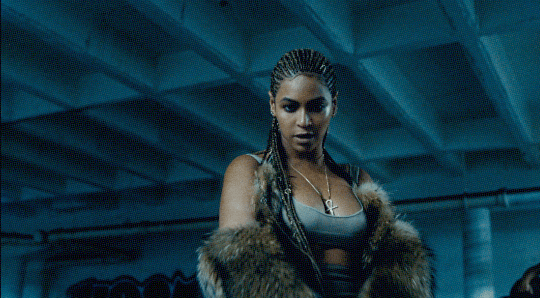
The visual for Lemonade helps display the black culture and history. Lemonade features black women with their natural hair out, along with Bantu Knots, Braids, and many more styles deemed “ghetto” by mainstream society. It also displays many different clothing with African prints, along with traditional style clothing is featured as well, especially with “Daddy Lessons.” “Daddy Lessons,” ”Freedom,” and “Forward” were mostly filmed on a plantation. One scene in “Forward” displays the women dressed in all white, working on preparing a meal like how they would on plantations. “Forward” and “Freedom” also features images of slain black men and women being honored in pictures. It also has the mothers of Trayvon Martin, Mike Brown, and Eric Garner holding pictures of their sons. “Freedom” ends with all the woman dressed in all white standing in solidarity, which is something we need to do, and help promote.
Beyoncé performed these songs on national television, in front of supporters, and haters and racists, regardless; the message was seen and heard. We have to get in Formation, meaning we have to come together, support one another, support ourselves and the cause. #BlackLivesMatter and by that i mean #ALLBLACKLIVESMATTER we can’t pick and choose. Although Lemonade was mostly women, there were black men as well, gay and straight men and women, famous and rich, and non famous; we are one in the same in this cause and have to fight together in this battle, not against each other.
Black America Again:
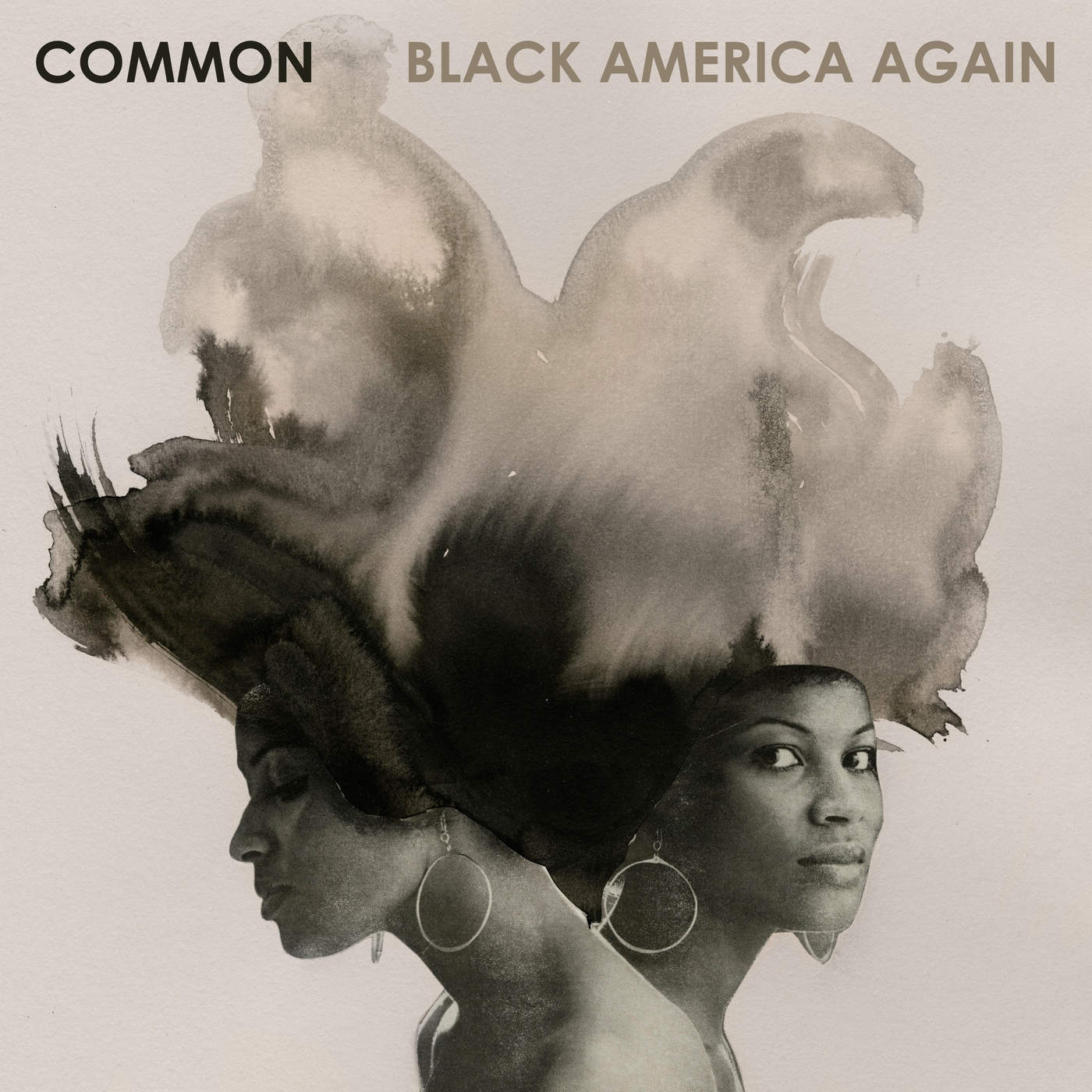
“Black America Again” is Chicago native Common’s 11th studio album, and during a time where racial injustices are prevalent; it will go down as a staple of black music during the time with messages of black empowerment, knowledge, self-love, black on black crime, black history, and more.
Black America Again portrays what the title is, black america, our thoughts, our problems, our fears, but there is hope; hope in which “we are rewriting the black American story.” Throughout the album, Common makes references to a variety of topics and issues within our community, while trying to promote good values. “I felt like Black America Again was a strong statement and it also was a way to start the conversation to say black America Again isn’t only about the protesting and the justice,” Common told Billboard. “Black America Again is about humanity and how we express ourselves, love and ways of feeling free.” This is the Hip-Hop we should have, music with a message to uplift and encourage. This album has a strong emphasis on the black woman, helping the black woman, encouraging the black woman, the black woman most of us came from, but we as society allow others, including our own community to disrespect the black woman in everyday life. He has a song on the album “The Day Women Took Over,” where he describes how the world would be if women ruled the world, how it could go back to how it was, chivalry, respecting women, not referring them to hoes, knowing their worth, and more. In the song he praised Michelle Obama, Oprah, Maya Angelou, Beyoncé, and more; their contributions to the African-American movement.
“Mothers get medals for being courageous soldiers/ On dollars, it’s Michelle Obama, Oprah and Rosa/ The mayor, the shah is Liz Dozier/ Hoods feel safer, families feel closer/ We all drunk in love with no need to be sober/ Ladies get their hair done, and men, we notice/ You get high grade Indian weaves, at the lowest/ Prices, chivalry is no longer lifeless/ We openin’ doors and pulling out chairs again/ Things are merry and there’s more marryin’/ Monthly free doses of Motrin and Valerian/ For your menstrual, it’s no more minstrel shows/ Depicting women as ignorant simple hoes/ It’s more love songs on the radio/ Respect for the ladies, you can hear it in the flow”
On his song “Letter To The Free (Feat. Bilal),” which was written for the Ava DuVernay directed film, 13th. is a song that will tug on your heart, mind, and spirit. Common addresses our history with slavery (physically and mentality), hangings, mass incarceration and more to relate it to what is happening today in society. History always repeats itself when lessons aren’t learned, just in new forms. It addresses many of the issues, past and present, which results in the way many of us think or are taught growing up, the problems from our past that seem to stay present in the future; for example, the new Jim Crow (Mass Incarceration).
“Southern leaves, southern trees we hung from/ Barren souls, heroic songs unsung/ Forgive them Father they know this knot is undone/ Tied with the rope that my grandmother died/ Pride of the pilgrims affect lives of millions/ Since slave days separating, fathers from children/ Institution ain’t just a building/ But a method, of having black and brown bodies fill them/ We ain’t seen as human beings with feelings/ Will the U.S. ever be us? Lord willing!/ For now we know, the new Jim Crow/ They stop, search and arrest our souls/ Police and policies patrol philosophies of control/ A cruel hand taking hold/ We let go to free them so we can free us/ America’s moment to come to Jesus”
Through the album, Common approach very sensitive topics with growth, knowledge, power, and understanding. The 15 track album features Bilal, John Legend, Stevie Wonder, PJ, and more. He takes you on a journey, and that journal is respected and heard and louder after watching the short movie Common put together with the album. “Black America Again” is an album, and a phrase that we should take, promote, and show the world who we truly are as a community, how string and resilient the black community is. Purchase Black America Again here: #BlackAmericaAgain
“N*ggas get foreign cars and think they made it/ It ain’t yours til you create it”
J.Cole – 4 Your Eyez Only:
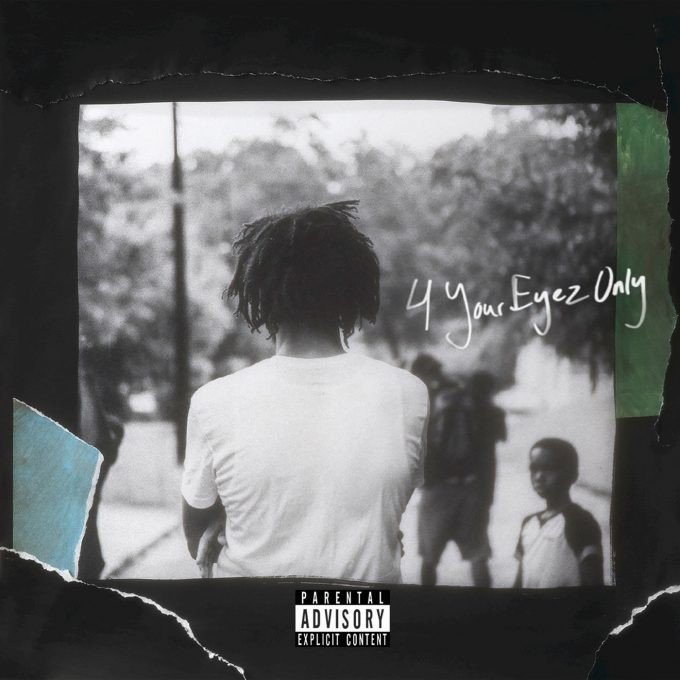
J. Cole is the true definition of low-key, since his last album “2014 Forest Hills Drive,” he has gotten married, had a child, and recorded an album and singles with videos.
Cole’s latest album “4 Your Eyez Only” has only elevated Cole as a true rapper and lyricist that he was destined to be since the beginning.
Throughout the album, Cole addressed many issues he’s faced, but also black America. Ranging from suicide and mental health to mass incarceration and its after effects on the black man, love, having and raising a family, his newborn baby girl and wife, how he’s perceived by some Americans, his neighbors (as a drug dealer), and more. This album is definitely a deeper examination of Cole, his life, and many black males in America. It’s an album about growth and question, examination and acceptance. The album has 10 tracks, and a visual to go along with the album (that’s available on TIDAL).
“4 Your Eyez Only” Tracklist:
1. For Whom The Bell Tolls
“But what do you do when there’s no place to turn?/ I have no one, I’m lonely, my bridges have burnt down/ Lord, Lord—/ The bells getting loud, ain’t nowhere to hide/ Got nowhere to go, put away my pride/ Tired of feeling low even when I’m high/ Ain’t no way to live, do I wanna die?/I don’t know, I don’t know”
2. Immortal
“To die a young legend or live a long life unfulfilled/ Cause you wanna change the world/ But while alive you never will/ Cause they only feel you after you gone, or I’ve been told/ And now I’m caught between bein’ heard and gettin’ old/ Damn, death creepin’ in my thoughts lately/ My one wish in this bitch make it quick if the Lord take me/ I know nobody meant to live forever anyway/ And so I hustle like my niggas in Virgini-A/ They tellin’ niggas sell dope, rap or go to NBA, in that order/ It’s that sort of thinkin’ that been keepin’ niggas chained/ At the bottom and hanged/ The strangest fruit that you ever seen/ Ripe with pain, listen…”
Cole is referencing “Strange Fruit”, a song by Billie Holiday, which protested the lynching and killings of African-Americans, and alludes to the fact that black people are still facing struggles similar to their slave ancestors.
3. Deja Vu
“Sometimes you worry bout the things he can provide for ya/ Whenever you around I seem to come alive for ya/ I finally recognize the feelings that’s inside for ya/ Although I know your man and trust me he would die for ya/ These quiet thoughts of you been going on for years now/ I saw you in the party soft lips soft spoken/ I came and talked to you but homie interfered now/ He introduced you as his girl and I was heartbroken”
4. Ville Mentality
“How long can I survive with this mentality?/ How long can I survive with this mentality?/ Trials and tribulations/ I’m facing in this age of information, I hate this shit/ Cause niggas hit my phone when they want some shit/ Bitches hit my phone when they want some dick/ Damn it, won’t be long ‘fore I disappear/ Damn it, won’t be long ‘fore I disappear”
5. She’s Mine, Pt,1
“Every time you go to sleep you look like you in Heaven/ Plus the head game is stronger than a few Excedrin/ You shine just like the patent leather on my new 11’s/ You read me like a book like I’m the Bible, you the Reverend/ Yeah, I wanna tell the truth to you/ I wanna talk about my days as a youth to you/ Exposing you to all my demons and the reasons I’m this way/ I would like to paint a picture, but it’ll take more than a day/ It would take more than some years to get all over all my fears”
6. Change
“Change” is a precursor for his song “4 Your Eyez Only.” talking about his close friend James.
“Pistols be poppin’ and niggas drop in a heartbeat/ Scattered like roaches, a body laid on the concrete/ Body laid on the concrete/ Look, somebody laid on the concrete/ No time for that, ain’t no lookin’ back, cause I’m running too/ I made it home, I woke up and turned on the morning news/ Overcame with a feeling I can’t explain/ Cause that was my nigga James that was slain, he was 22/ (Last night at around…) He was 22”
7. Neighbors
“I guess the neighbors think I’m sellin’ dope, sellin’ dope/ Sellin’ dope, sellin’ dope, sellin’ dope/ Well motherfucker, I am/ Some things you can’t escape; death, taxes, and a racist society that make every nigga feel like a candidate/ For a Trayvon kinda fate, even when your crib sit on a lake/ Even when your plaques hang on a wall/ Even when the president jam your tape/ Took a little break just to annotate/ How I feel, damn it’s late/ I can’t sleep cause I’m paranoid/ Black in a white man territory”
8. Foldin Clothes
“I wanna fold clothes for you/ Woke up this morning/ Feeling like the best version of me, so happy/ I, walked in the living room/ And saw you all alone on the couch, just napping/ I—I see a lot on your plate/ 9 months with that weight/ I know you tired so I wonder how I can help/ I get the basket and grab your clothes out the dryer/ Oh, I wanna fold clothes for you”
9. She’s Mine, Pt. 2
“Ib gon’ ask me how I did this shit/ I’m gon’ do a humble stunt act like I meant this shit/ That’s the ego taking credit for what God made/ Fuck this album shit, hey mama look what God made/ (She’s mine) Catch me/ (She’s mine) Don’t you, catch me/ (She’s mine) Don’t you, catch me/ I’ve fallen in love for the first time/ I wanna cry, and I ain’t even tryna fight it/ Don’t wanna die, cause now you’re here/ And I just wanna be right by your side/ On any night that you be cryin’ baby/ I dry your eyes, I dry your eyes”
10. 4 Your Eyez Only
“You probably grown now so this song’ll hit you/ If you’re hearing this, unfortunately/ Means that I’m no longer with you in the physical/ Not even sure if I believe in God but because you still alive/ He got me praying that the spiritual is real/ So I can be a part of you still, my pops was killed too/ So I know how part of you feels/ Maybe you hate me, maybe you miss me, maybe you spite me/ Life goes in cycles, maybe you’ll date a nigga just like me/ I hope not—I’m tired of dope spots”
The most prominent information he’s rapping about on this project as a whole is what’s most fascinating. Although these stories have elements of Cole’s life, a few songs, the last song in particular, shows his friend’s story. In “4 Your Eyez Only,” Cole is speaking of his friend that passed away, his story, what he wanted to pass down to his daughter, his thoughts, feelings, emotions, life story and more. The album is not just a look into Cole’s world, but it relative to many people. “4 Your Eyez Only” is a staple for the culture, it;s elements of realness is something needed in this world of Young Thug, Lil Boats’ and whatever else is out there. A staple of real Hip-Hop, if you open your ears. “J.Cole is boring”… No, J. Cole is for the people, people are so quick to want guns, violence, and hoes in music but cant respect real artistry or poetic flows. rap is poetry, a way of expression, expression of viewpoint, political problems, social problems, and more. This album addresses those issues with story telling, not only his stories and life, but his friend James. How we all have paths in life to choose.
Solange “A Seat At The Table”
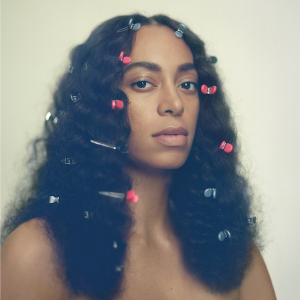
Solange delivered on this album, and she is finally getting the recognition she deserves. “A Seat At The Table” is such a powerful album for many reasons, ranging from its pro-black message, to it’s beautiful imagery; she’s taking the listener on a journey. Making people realize they don’t have to be victims, that we are strong. This album can pretty much be summed up through her own lyrics, Fubu style. “For us, this shit is for us!”
That line alone is beautiful, real, and powerful at the same time. Some things are just ours, like how certain things are just for Hispanic people and their culture, how some things are just for the Asian culture, and so on and such forth. Growing up, we are taught American history, which is really white history. We are taught Christopher Columbus discovered America, that he and the Native Americans had Thanksgiving dinners together to celebrate one another. We are taught that slavery was such a long time ago, and that racism doesn’t exist. We’re rarely taught black history, and no, black history month doesn’t count. You can’t pack centuries of cultural advancements of African-Americans in one month.
Solange made an album celebrating her blackness, our blackness, our culture, the struggle, the strength, the beauty, the knowledge, the pain. Just everything. Not just music either, but stories as well. Stories from Master P, her mom Tina, and dad, Matthew, where they share their own experiences and trials with simply being black, discussing issues/stories of black pride, racism, overcoming the struggle, being successful, and more.
“I think part of it is accepting there’s so much beauty in being black,” said Tina Knowles-Lawson on the interlude track “Interlude: Tina Taught Me.” “And that’s the thing, I guess, that I get emotional about, because I’ve always known that. I’ve always been proud to be black. Never wanted to be nothing else, loved everything about it. Just, its beauty in black people and it really saddens me when we’re not allowed to express that pride in being black. And that if you do then it’s considered anti-white. No, you’re just pro-black, and that’s okay, the two don’t go together. Because you celebrate black culture, does not mean that you don’t like white culture, or that you‘re putting it down. It’s just taking pride in it. But what’s irritating is when somebody says ‘they’re racist. That’s reverse racism. Or, they have a black history month, but we don’t have a white history month.’ Well, all we’ve ever been taught is white history, so why are you so mad at that. Why does that make you angry? That is to suppress me, and to make me not be proud.”
The album features 21 tracks that are beautifully crafted, to heal, help, and encourage black people. Solange has been vocal on social media and in interviews about the social injustices going on, #BlackLivesMatter, and her personal experiences of ignorance and racism. Solange’s music has been timeless, creative, and has addressed different issues for years, and it’s time that her work is appreciated. Let’s go through a few tracks for example.
Track 2: Weary
“I’m weary of the ways of the world/ Be weary of the ways of the world/ I’m weary of the ways of the world… Be leery ‘bout your place in the world/ You’re feeling like you’re chasing the world/ You’re leaving not a trace in the world/ But you’re facing the world”
Solange has grown weary of the ways of the world, especially of the way it treats black people and their bodies. How they value us for athleticism or musical ability, but hate when you speak up about social injustices and standing up for what’s right. “I’m weary of the ways of the world.” The countless killings but unqualified people who are suppose to serve and protect everyone, not shoot their gun off whenever they want.Solange is telling us not only to be weary of our place in the world, but to be suspicious, be cautious of it. Think for yourself about your place in this world? Why are you treated the way you are?
Track 4: Cranes In The Sky
“I tried to drink it away/ I tried to put one in the air/ I tried to dance it away/ I tried to change it with my hair”
“Cranes in The Sky” presents a more internal reflection on Solange herself, but something many people can relate it, trying to not feel pain. Those lyrics represent someone trying to get over the pain they are experiencing, trying to become numb to their surroundings, what’s happening in the world. Solange, for example, tried many things to get her mind off of what is happening with police brutality. She tried to numb herself focusing on her aesthetic; drowning her sorrows in alcohol, weed, dancing to music, and changing her appearance. Just trying to mask her pain from those on the outside.
Track 6: Mad (Feat. Lil Wayne) #I’veGotALotToBeMadAbout
“I ran into this girl, she said, ‘Why you always blaming? / Why you can’t just face it?’ (Be mad, be mad, be mad)/ ‘Why you always gotta be so mad?’ (Be mad, be mad, be mad)/ ‘Why you always talking shit, always be complaining?’ / ‘Why you always gotta be, why you always gotta be so mad?’ (Be mad, be mad, be mad) / I got a lot to be mad about (Be mad, be mad, be mad)”
“Mad” features rapper Lil Wayne, who raps about fighting his own suicidal thoughts, his fight to stay alive while learning to let go of the things holding him back. Solange is attacking the stereotype that black women are “always mad,” or “angry.” Solange, like every other person, black women in particular, is entitled to her emotions, her feelings, and her outrage. Facing criticism about her speaking about her being a black woman in general, what they face on a daily basis, how they are silenced, even by men in her own community. “Why you always blaming? / Why you can’t just face it?” Why be silencing, why be forced to be silent when expressing oneself?
Track 9: Don’t Touch My Hair (Feat. Sampha)
Verse 1: “Don’t touch my hair/ When it’s the feelings I wear/ Don’t touch my soul/ When it’s the rhythm I know/ Don’t touch my crown/ They say the vision I’ve found/ Don’t touch what’s there/ When it’s the feelings I wear”
“They don’t understand/ What it means to me/ Where we chose to go/ Where we’ve been to know/ They don’t understand/ What it means to me/ Where we chose to go/ Where we’ve been to know”
Nothing else needs to be explained after reading the title, and lyrics of the song. “Don’t touch my crown.” Asking to touch a black woman’s hair, or even worse, just putting your random fingers in her hair is disrespectful. For years, black women have been programmed to believe their hair is nappy, dirty, unprofessional, and so many more negative connotations that its scary. Their hair is their crown, its more than hair, it’s a powerful connection with self love, and one’s past. Solange explained on her website the importance of her own hair to her.
“I believe that hair is incredibly spiritual, and, energetically, it really encompasses and expresses who we are. Obviously, my relationship with hair, being that I grew up literally in a hair salon, is very deep and very complex. I think that one of the things that I’m also trying to communicate through that song is the way that people see us through our hair”
This album is a representation of what it means to be unapologetically black, to have pride in one’s self, in one’s culture. “A Seat At The Table” is an example of what a strong black woman can do, what she has to say, and so much more. It’s a representation, it’s a statement, and this album alone will go down in history as a beautifully crafted pro-black album. So please listen to “A Seat At The Table,” take that seat, and drink some lemonade while you’re at it.
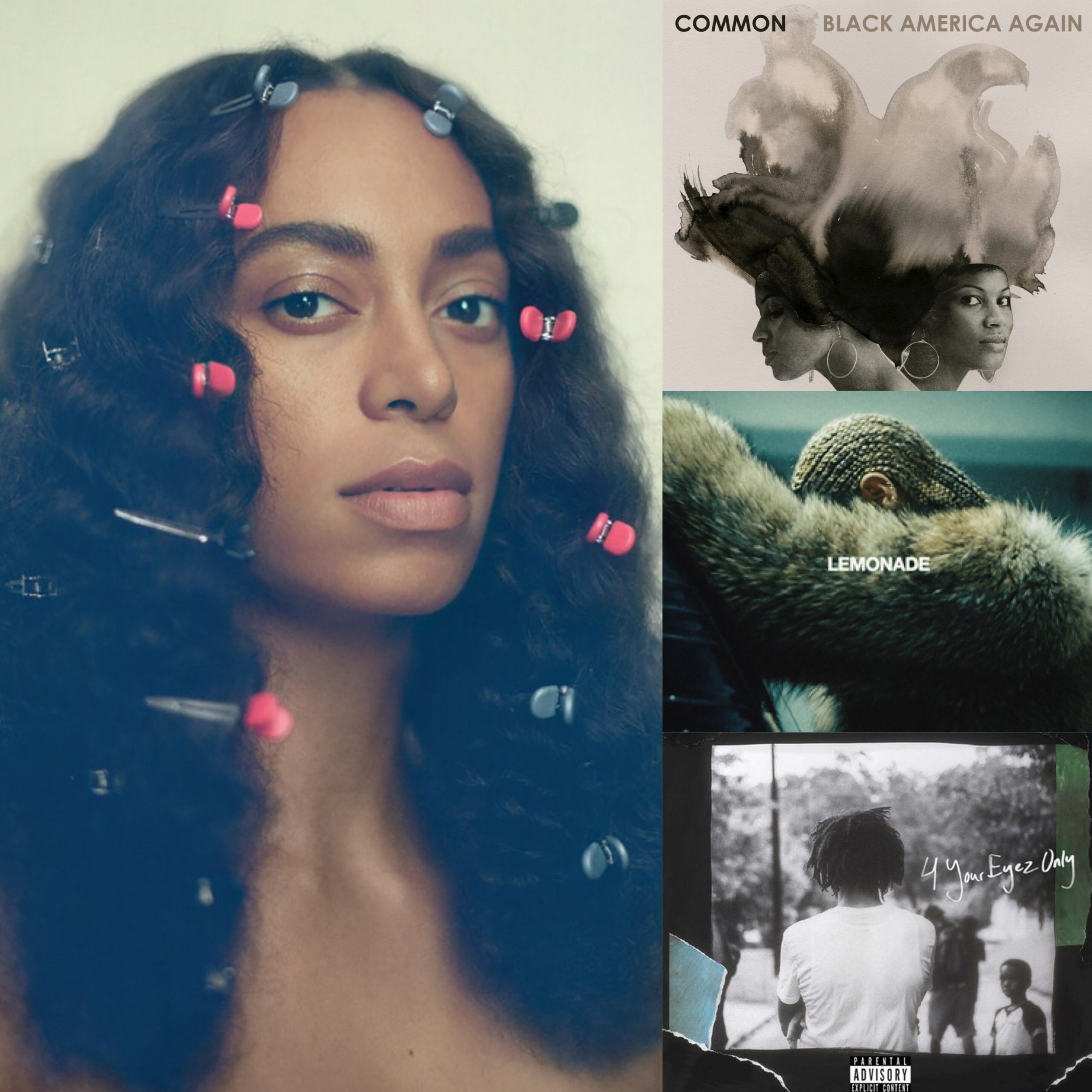
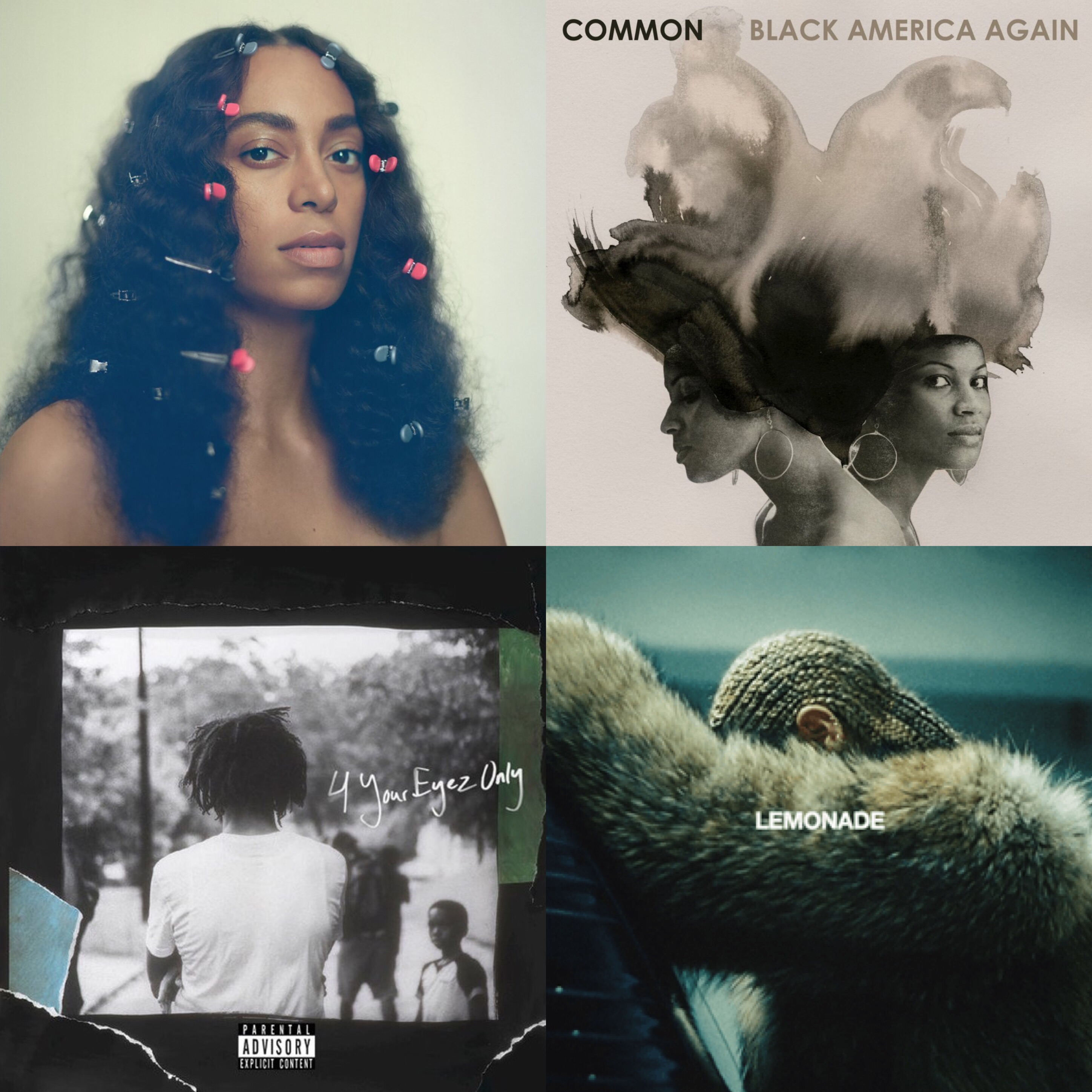
I have been browsing on-line more than 3 hours lately, but I never found any attention-grabbing article like yours.
It’s pretty price sufficient for me. In my view, if all
website owners and bloggers made just right content material as you did, the net will be
much more helpful than ever before.
I have been browsing online more than 2 hours today, yet I never found any interesting article like yours.
It is pretty worth enough for me. Personally, if all webmasters and bloggers made good content as you did, the internet will be much more useful than ever before.